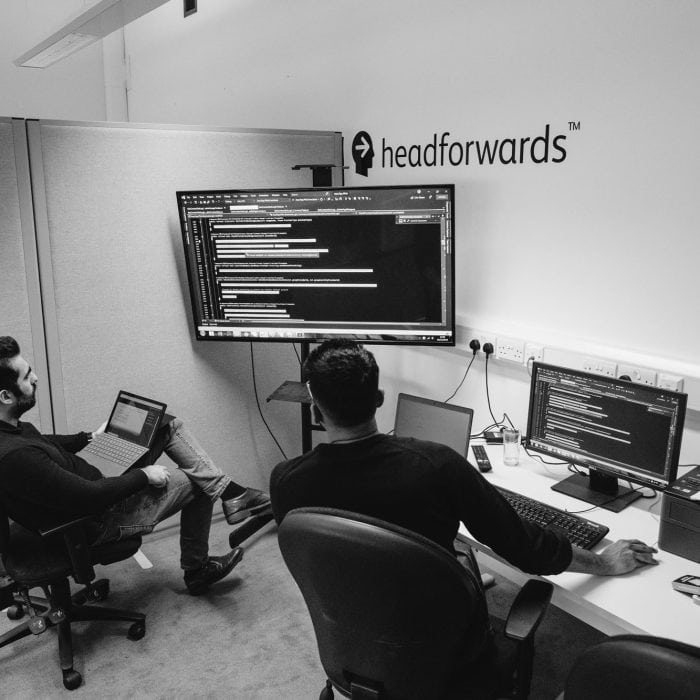
An Exciting Future for AI in UK Healthcare
As a leading software developer, Headforwards is looking forward to helping drive the innovation in Artificial Intelligence that will keep UK healthcare ahead.
Artificial intelligence means something slightly different to everyone, from IT buzzword to the next great leap in technology. Sometimes it can feel like little more than an urban myth, only applied in the largest of enterprises. But however you think of it, AI is set to make a huge impact on the global economy, with PwC predicting a $15.7 trillion contribution by 2030.
We’re already working on AI projects with clients across industries, bringing dedicated expertise to a complex, evolving technology that’s still very much a new venture for most organisations. We’ve previously discussed some of the potential for local authorities and healthcare applications, but the possibilities are near-endless and span every sector – if you approach it in the right way.
Although thousands upon thousands of businesses already have AI projects underway, many industry leaders are still talking about AI in the highest-level terms, making it difficult to define it – and its applications – in a practical way. But like any major technology, adopting AI is all about balancing the benefits and risks. To help put that in perspective, here are some key considerations for organisations to make before getting started.
For some companies, forays into AI won’t go beyond basic automation, aimed at making processes faster and more efficient. Others, however, are investing heavily in deep learning, machine learning and advanced AI technologies that can support increasingly sophisticated applications, from natural language processing to data-led medical diagnoses.
Major organisations have major budgets – and that makes them the ideal candidates for major AI investments. But that doesn’t mean they’re the only ones that can realise its potential. For small businesses, investing in AI is a brave move – but it’s not an irresponsible one if you approach it with the right plan and the right partner.
And although some large organisations are completely committing to AI technologies, AI doesn’t have to be the heart of everything you do. There’s often a sense of “all or nothing” that can be off-putting to smaller organisations that don’t have the requirements or budgets for a large-scale AI rollout. But as we’re continuing to see in our own work at Headforwards, small AI projects can be hugely effective as standalone parts of your IT infrastructure – it’s all about identifying the right places to apply AI for the biggest returns.
Even if you do fully commit to AI within your organisation, it doesn’t have to be a big-bang project that integrates new technologies into every process all at once. In fact, it’s much more effective to take small steps, each with a clear goal and performance indicator attached to it. It’s the best way to adopt AI without overspending or putting too much pressure on your time and personnel resources.
It’s the same as any new technology – by starting with pilot projects and proofs of concept, you can ensure your new systems or processes will cause the smallest amount of disruption possible as you implement them. You can also closely monitor the impact from day one, measuring the real-world benefits and identifying areas for improvement.
You’ll obviously go into your AI project with an idea of the outcomes and benefits you’re looking for. But it’s important to always have an open mind and look for extra opportunities to find value from your implementation. Recently, we’ve been working on a project that integrates AI into the way our client’s customers access data storage. By automating the process, customers can find the data they’re looking for without having to get in contact with a customer service representative – removing delays from the equation.
Beyond the obvious benefits, this has freed up two whole teams that are now able to concentrate on new products that we’re helping them develop. And, unexpectedly, the extra layer of AI-led security that we’ve implemented has helped the business start competing in the finance industry for the first time, as their solution now includes the stringent data protection the sector requires.
As always, it’s important to consider the risks of not implementing AI properly – as much as there’s an opportunity for unpredicted benefits, you can open yourself up to pitfalls if you’re not careful.
Of course, there are real risks if you get AI wrong. Without the right combination of technologies, or the right implementation approach, you can open yourself up to the negative impacts of bleeding-edge innovation. Understanding the risks that your particular application can have is key to mitigating them. Here are a few to consider as you plan your project:
The most important thing to remember is that these risks – and any others you might encounter as you plan your own AI project – aren’t insurmountable. They just require the right framework and approach.
Getting AI right can be a challenge, but at Headforwards we’ve built an understanding of the best way to approach an AI project – and that understanding is evolving all the time as the landscape changes and new innovations join the fray.
Every project will require a slightly different approach – a different mix of skills, technologies, coding techniques and more – and our people can help you find that pathway to a successful AI implementation.
Talk to us today about your AI ambitions, and let us show you how outsourced development can help you realise them.
Headforwards™ is a Registered Trade Mark of Headforwards Solutions Ltd.
Registered Address: FibreHub, Trevenson Lane, Pool, Redruth, Cornwall, TR15 3GF, UK
Registered in England and Wales: 07576641 | VAT Registration Number: GB111315770